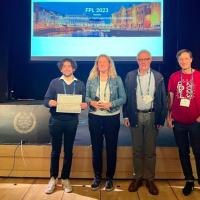2 min read
Stefan Abi-Karam, a member of the Georgia Tech Research Institute (GTRI) and a Ph.D. student was recently honored with the prestigious FPL Community Award for his significant research contributions within the field-programmable logic community.
5 min read
A trio of School of Mathematics faculty have received top honors from the American Mathematical Society, with Professor Jennifer Hom taking home the 2024 Levi L. Conant Prize, and Professors Greg Blekherman and Thang Le selected as 2024 AMS Fellows.
3 min read
Georgia Tech's Srijan and his colleagues have developed a roadmap to detect and mitigate disinformation created by increasingly sophisticated generative AI systems.
3 min read
Georgia Tech cybersecurity and privacy researchers have uncovered a significant threat that exploits a vulnerability in the Safari web browser
3 min read
This paradox is called the solar rebound effect: the ratio of the increase in energy consumption to the amount that is generated by the solar panels.
3 min read
Georgia Tech researchers have developed a first-of-its-kind automated measurement tool that can assess password protection policies across the internet.
3 min read
The Institute for Electronics and Nanotechnology and the Institute for Materials have announced they will combine to form a new Interdisciplinary Research Institute set to begin operations on July 1, 2024.
4 min read
Physics Professor Nepomuk Otte and students have developed the Trinity Demonstrator to search for sources of high-energy neutrinos that contain clues to the early universe.
4 min read
The Georgia Institute of Technology is building MSI partnerships and recently hosted its first research collaboration forum (RCF) specifically to develop these relationships with Historically Black Colleges and Universities (HBCUs).
5 min read
In a new study, Georgia Tech researchers investigated whether 25 rare gene variants known to be associated with inflammatory bowel disease (IBD) play a role in risk for African Americans.















